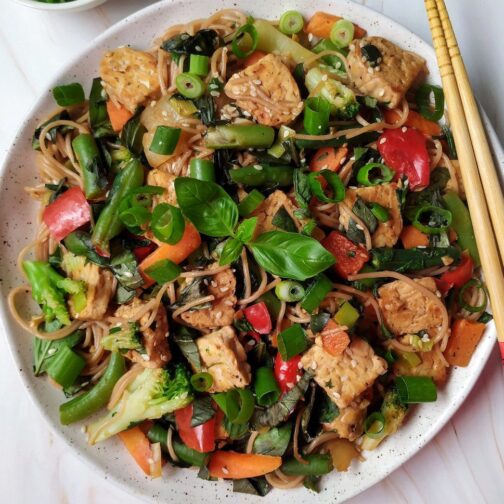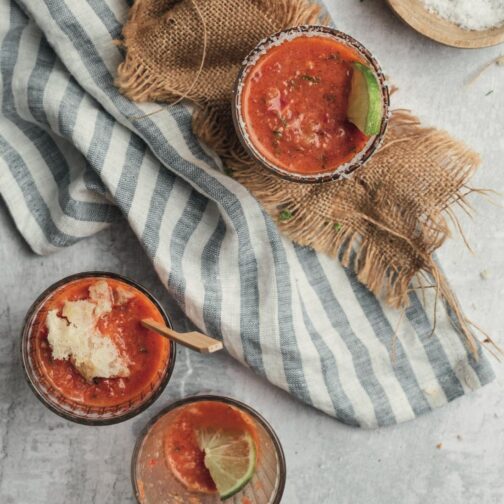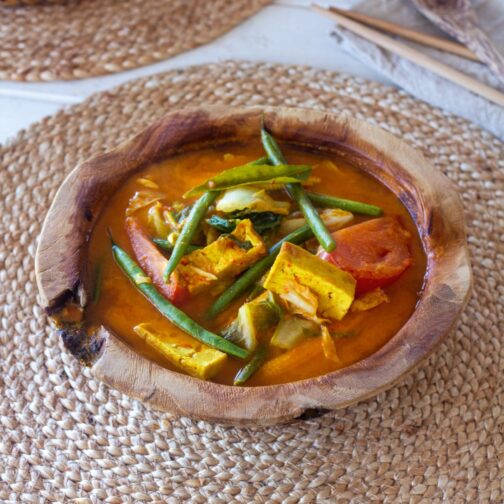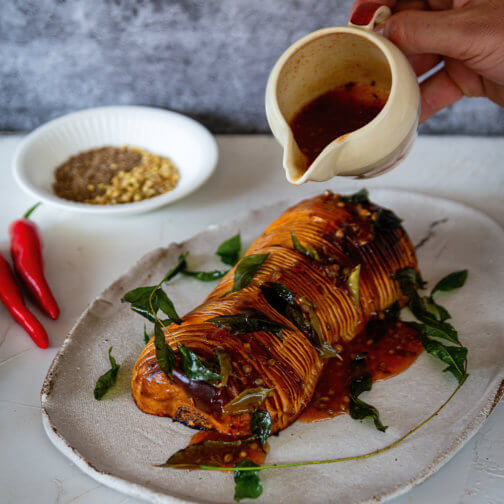
Plant-based nutrition expert Hollie Waters APD shares five reasons to leave poultry off your plate.
A balanced and varied diet forms the foundation for healthy eating. Vegetables, fruit, whole grains, and protein-rich foods should be consumed regularly. When it comes to the best source of protein the advice is clear; choose plant-based.
Unfortunately, it appears this hasn’t translated into practice. The average Australian is consuming as much as 46 kilograms of chicken per year – more than anyone else in the Western world. With this trend predicted to continue, it’s time to challenge the misconception that chicken is a “clean meat”.
Let’s take a look at just five of the reasons to choose chickpeas over chicken.
1. To keep your cholesterol levels in check
Often touted as a leaner alternative, it may be surprising to learn that chicken increases cholesterol levels to the same extent as red meat. While cholesterol is necessary for healthy body function, too much can cause serious health problems. Not only is chicken a source of dietary cholesterol, but it packs in around 50 grams of fat per 100 grams, with 30 percent of that being saturated. A diet rich in saturated fat boosts your body’s own production of cholesterol, whilst increasing the risk of heart disease, breast cancer, Alzheimer’s disease, dementia, and cognitive decline. Fortunately, there are many plant-based protein sources that are low in saturated fat and won’t send your LDL (“bad”) cholesterol levels through the roof.
Unlike chicken and other animal products, chickpeas contain absolutely no cholesterol. They’re also a rich source of soluble fibre, which reduces the production of cholesterol in the liver and its absorption in the small intestine. A win-win for those with high cholesterol levels. There are a number of additional benefits to eating plenty of chickpeas (or any other legume for that matter) too. These include the effect on your gut; boosting the population of good bacteria, making bowel movements easier and more regular, and even improving your mental health.
2. For a hard-pass on pathogens
According to Food Standards Australia New Zealand, 80 percent of raw chicken meat is contaminated with intestinal bacteria that could cause food poisoning. The most common strains include E.coli, salmonella, and campylobacter. The strain of E.coli commonly present in chicken meat, aside from causing a range of gastrointestinal effects, has also been found to cause drug-resistant urinary tract infections (UTIs) among poultry-eating women.
Zoonotic diseases present a significant and looming risk to human health. Although bird flu has featured less prominently in recent times, it remains a serious illness that is easily transmitted as a result of the poultry-farming practices employed in Australia. If you thought buying free range reduced the risk, think again. The number of birds permitted per square metre is the same for both conventional and free-range reared chickens.
The best solution is to ditch the animal products in your diet. In doing so, you’ll be eliminating the most common carrier of these disease-causing microbes.
3. To cut your cancer and diabetes risk
Although cooking kills a majority of bacteria, heating meat forms carcinogenic compounds called heterocyclic amines. Cooked chicken is particularly high in PhIP, a heterocyclic amine which has been shown not only to trigger cancer and promote tumour growth, but also increase its potential to spread.
In contrast, eating chickpeas supplies your body with various cancer-fighting compounds, such as lycopene, saponins, and short-chain fatty acids known as butyrate. Studies show that butyrate helps your body to detect and destroy sick and dying cells, thereby reducing your risk of developing cancer.
While a plant-based diet is accepted as protective against diabetes, it’s interesting to note that not all animal products affect the risk equally. Studies show that higher intakes of poultry are associated with a significantly greater risk of developing diabetes. The risk increases further, irrespective of how much is eaten, when the chicken meat is cooked at higher temperatures.

4. Because there’s no Planet B
Feeding, slaughtering, and processing animals for human consumption has a devastating impact on our environment. The poultry industry releases large amounts of waste, polluting land and water with excrement, nitrate and pathogens. Natural habitats are also destroyed, as land is cleared to accommodate production facilities, resulting in the loss of biodiversity.
Pulses, such as chickpeas, on the other hand, improve the health of the soil and help in the fight against climate change by fixing nitrogen from the atmosphere. As part of crop rotation, chickpeas help alleviate problems caused by continuous cereal cropping; such as fungal root diseases, depletion of soil organic matter, degradation of soil structure, and herbicide resistance in weeds.
5. To support a healthy, happy and well-nourished body
The biggest plant-based myth is busted yet again when you compare chicken to chickpeas. Per 100 grams, the two are head-to-head for protein content. Where they differ is what makes legumes really shine. The humble chickpea is higher in iron, calcium, and dietary fibre (chicken contains none!). They’re also a rich source of B-group vitamins, selenium, and potassium, offering protection against cardiovascular disease.
When it comes to maintaining a healthy weight, meat consumption has been consistently shown to contribute to weight gain in both men and women; as little as 20 grams of chicken meat per day may result in a significantly greater increase in body mass index (BMI) when compared to those following a plant-based diet. Plant-based protein sources, such as chickpeas, contain an ideal balance of complex carbohydrates and protein to support appetite regulation, stable blood sugar levels, and the maintenance of a healthy body weight. Their high nutrient and low calorie-density makes any legume a nutritious addition to your diet.
When it comes to choosing chickpeas over chicken, the choice is clear. With a higher nutritional value, substantially lower cost, and significantly reduced impact on our fragile environment – chickpeas are the all-round winner!
***
Hollie Waters will be speaking at the Nutrition in Healthcare Conference 2023, hosted by health promotion charity Doctors For Nutrition. Coming to Melbourne from 17–19 February, the conference will bring together some of the leading experts on whole food plant-based eating and its positive effects on your health and the environment.
To learn more and register, visit doctorsfornutrition.org/nihc





















